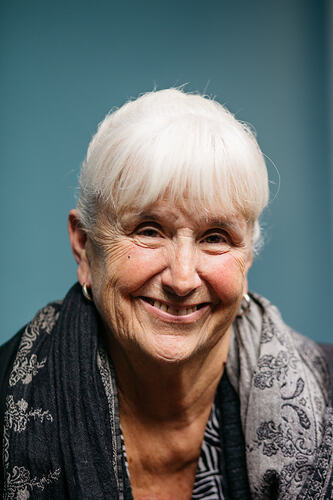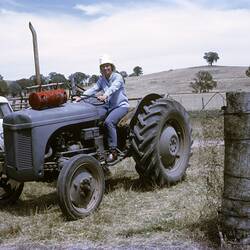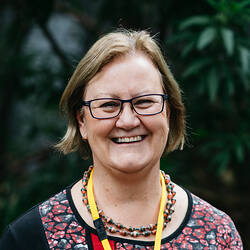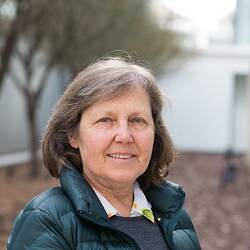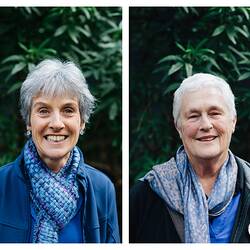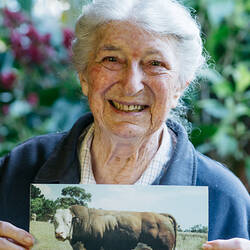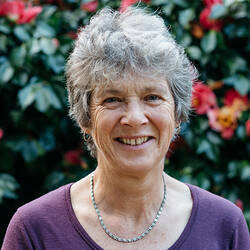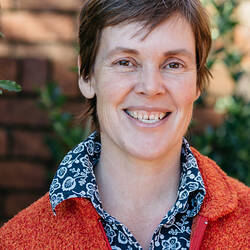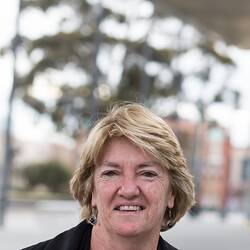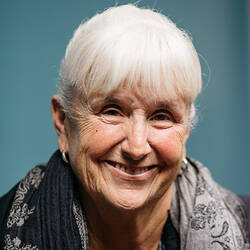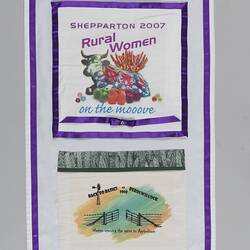Caroline Hogg contributed significantly to the Rural Women's Movement through her work as a politician for the Australian Labor Party in Victoria (1982-1999). She was a member of the Victorian Legislative Council from 1982 to 1996 and a minister in the governments of John Cain and Joan Kirner. Caroline worked alongside her peers to help facilitate rural women's networking opportunities during the 1980s-1990s, particularly through her work with the Office of Rural Affairs and its' entailing Rural Women's Network. She actively worked with rural women to bring them closer to government processes, and to raise the profile of farming women at a policy level. Caroline holds an Order of Australia for her service to the Parliament of Victoria, with her commitment to rural affairs being listed as one of her major achievements.
The following excerpts were taken from an interview with Caroline Hogg, recorded by Invisible Farmer Project Curator Catherine Forge at Melbourne Museum on 20 July 2015.
What do you remember of rural women's networking in the 1980s-1990s?
I remember energy, enthusiasm, breaking into small groups, lots of butcher's paper (laughs), all those things, and you know people being very keen to relay their views back to government and if I was there, I'd always take them back. We had to listen to the voices of the women as much as the voices of the men, because they told a different story sometimes. I mean they told a story very often of hardship and of striving and of the satisfaction of living on a farm, but they would tell the underside, that the men wouldn't tell. They'd tell the big narrative. The coming together was very important and there were a lot of coming together days, whether it was Women on Farms Gatherings or whether it was a Rural Women's Network or whether it was when we went out as a Rural Committee of Cabinet.
What are some of the major issues that you recall rural women were articulating?
I suppose it was a lack of recognition of the work that women were doing. Many of the women I got to meet, were in fact the off farm earners, though I also met many women who were farming as well. There were patches of bad drought during that time. There was a bad downturn in the Southern Mallee and it was always very difficult. The women were so conscious of the fact that their husbands were losing face if the farm looked as though it was being lost, whereas the women had to look after their husbands, they had to look after themselves, they had to look after kids and if they were lucky they worked as a teacher, or a nurse and they brought in valuable off-farm income.
You mentioned this concept of recognition - can we elaborate on this a bit more?
Well we needed to recognise that women were equal players usually in what was happening in the country and remember, the Office of Rural Affairs was set up for people in country towns, as well as farmers. I mean that's very important to remember because the towns were dependent on the farms, and vise versa. And women played a more obvious role perhaps in the towns, running little businesses and being the matron of the local hospital, deputy principal of the little school, but we did need to recognise the work and the expertise of the women on the farms and the women in agriculture and I don't think a great deal had been said about that.
Tell me about your work with the Rural Women's Network.
Joan Kirner and I both launched the Rural Women's Network, I mean Evan Walker (the then-Minister for Agriculture) gave us that privilege. We launched it in Ballarat from memory, in the mid-1980s. Joan and I went to see the Country Women's Association (CWA) very early on to make sure that they understood that we weren't wanting to tread on their toes and that we deeply respected the work that they'd done, as we did. I mean, for heaven's sake, the Country Women's Association said they'd knit the stockpile of wool, while the males were saying they'd torch it. You know, we thought they did a fantastic job. But I think once the Rural Women's Network and its newsletter went out and when Joan and I were out there, Evan too, I mean I don't for one minute want to underestimate the role he played, and we had a lot of female staff in the Office of Rural Affairs too - there was a sense of energy and a drive to make positive changes for rural women. It was a golden term as far as I was concerned. I had a portfolio I adored and I was very keen to make certain that the department was very well aware of what was going on in rural areas.
How important do you think that the Rural Women's Network, and the Networker magazine, was in those years?
Hugely. Well hugely important. I just think the way it got women together and made them feel free to talk, to give them the confidence to talk about things. I mean when I talk about child sexual abuse, that wasn't talked about until the 1980s and then the lid came off and Child Protection, which we took over as a government department, came into focus. When I was given it in Community Services, I got a budget of four million. Within a year, we had to have fourteen million and you know, thus it's gone on, it's hundreds of millions now. But those things were not talked about previously. They were absolutely silenced until that lid came off and it really blew off. Those things weren't talked about before though, particularly domestic violence because there was a degree of shame about domestic violence that we had to try and break down. And it was a major issue for rural women.
Were there any challenges for you in working with rural women - any obstacles or roadblocks?
Look, there may be people who tell you that there were, but I don't remember any. The Rural Women's Movement was a wondrous thing that we had actually created and it just took off and it behaved sensibly. For two and a half years I was Minister for Health at a time when there was a hospital crisis, a cancer crisis, a crisis about absolutely everything you could think of and every hospital in the state was agitating for beds and neo-natal cots etc. So, to me, the Rural Women's Network was just such a pleasure to be with those women who looked for satisfactory, grounded solutions to everything. You know? Nobody seemed to be deliberately negative. I mean, if they were a bit critical of the way government was doing it, they'd tell us in a nice kind of way, so that we could pick it up and take it back to our colleagues and hopefully effect some change.
What were the successes of the Rural Women's Movement?
Well, gradual recognition in public life, the number of women in local government. In the time that I was on the Collingwood Council we went from one to five, out of fifteen, because we consciously tried to build up that council with women, just as now there is a conscious attempt to build up State and Federal Parliament with women. So I just think that the presence of women in public life is a benefit to public life. That's not saying of course that we've got all the answers, far from it. Many of the men I worked with I think were much brighter than I was, but they weren't always as balanced and they weren't always good listeners to the same degree. Some were, a couple were just as good at listening, but I mean I would say I was a really good listener and I think that's the job you have to do as a minister. I think all these women, who are now stepping into public positions must be gradually improving the polity, they must be.
More Information
-
Keywords
Agriculture, Farming, Rural Women, Rural Industry, Rural Victoria, Women's Associations, Conservation, Sustainable Agriculture, Women's Movement, Gender Roles
-
Localities
-
Authors
-
Contributors
-
Article types
